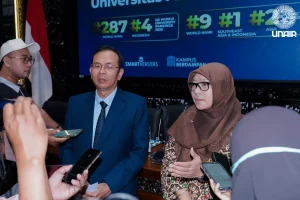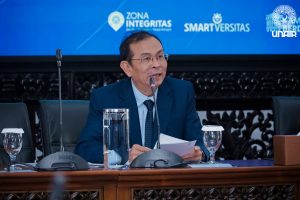UNAIR NEWS – The lack of pulmonologists was overwhelming for Indonesia in facing the Covid-19 pandemic. The Indonesian Society of Respirologists (PDPI) noted that there are barely 1,206 pulmonologists in 2020. Ideally, Indonesia should have at least 2,500 pulmonologists.
As the second-oldest medical school nationwide, UNAIR is committed to producing excellent and most qualified doctors, especially pulmonologists.
Established in 1957, the Pulmonary Disease Study Program of UNAIR Faculty of Medicine changed its name to Pulmonology and Respiratory Medicine Study Program in 2011. This study program has launched lots of reputable pulmonary specialists in Indonesia.
Head of the Department of Pulmonology and Respiratory Medicine, dr Isnin Anang Marhana Sp.P said that since 1957, the study program has strived to provide high-quality, excellent, and highly-acknowledged education at national and international levels.
UNAIR Department of Pulmonology and Respiratory Medicine advances in the management of sensitive and drug-resistant tuberculosis infections, integrated thoracic oncology management, thoracic medical intervention, management of chronic obstructive pulmonary disease (PPOK), and occupational lung disease management.
Notable alumni
Accredited A by the Indonesian Higher Education Independent Accreditation Institute (LAM-PTkes), the program has produced some notable alumni. The Dean of the Faculty of Medicine of Universitas Muhammadiyah Surabaya, dr Yusuf Wibisono; the Director of Regional General Hospital (RSUD) Sidoarjo, dr Atok Irawan; and the Head of Health Office Sampang, dr Abdullah Najich are some of them.
Because Indonesia is ranked second with most TB cases, dr Isnin said that competent pulmonologists are highly needed. He projected the need for pulmonary specialists and the challenges will be more complicated due to the rising exposure to harmful particulate matter from the industry and the increasing number of young smokers, which increase the risk for lung cancer.
Besides, the rise of non-standard treatments such as inappropriate herbal medicines, dukun [shaman], psychics, and the development of health technology may also challenge the treatment of lung patients. On the other hand, dr Isnin explained that the number of pulmonary specialists in Indonesia is still limited. They have not been distributed well throughout Indonesia.
Therefore, the UNAIR Department of Pulmonology and Respiratory Medicine is committed to improving the educational quality to produce qualified alumni. He believes that curriculum improvement based on community needs, facilities, implementation of scientific activities, and cross-section cooperation, the Department of Pulmonology and Respiratory Medicine will be able to launch excellent pulmonologists to face difficult challenges in the future.
Author: Ivan Syahrial Abidin
Editor: Binti Q Masruroh









